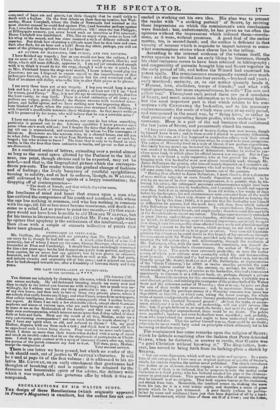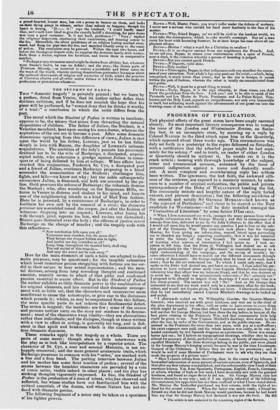RECOLLECTIONS OF SIR WALTER SCOTT. RECOLLECTIONS OF SIR WALTER SCOTT.
THE design of these Recollections (which originally appeared in Fraser's Magazine) is excellent, but the author has not suc- " I have said above, that the web of Scott's destiny was now woven, though he himself knew it not ; and in these words I alluded to pecuniary difficulties!,
which, in his case, as it has happened in numberless others, tusk their actual
rise and commencement at the very time when he seemed to be most prosperous. 'rite author cf Warerky lived on a scale of liberal, if not profuse expenditure. His family having grown up, increased his disbursements. He had begun, and
was resolved to finish, his mansion of Abbotsford ; besides, he wished to pur- chase more land, to which plans his official income was unequal. But in Con-
stable he now found a ready supporter, who at last proved his ruin. Tho bargains with this bookseller were now almost invariably made through Mr. James Ballantyne the printer, who himself mainly depended on Constable's aid. I believe the !atter vas kept in ignorance who had written the Waverley novels till some years later, when concealment became out of the question. " Having thus alluded to James Ballautyne, I must observe, that a character of more smiling integrity or more friendly disposition never existed. As he
was by no means of an over sanguine temperament, it is possible that, by fol- lowing his advice, the subsequent pecuniary embarrassments might have been avoided. But printers live by booksellers, and Constable's wealth and sagacity
were then looked on as unimpeachable. Even till within a few weeks or days before his bankruptcy, his real circumstances were concealed from all the world except the Linkers ; whose only chance of indemnity depended on keeping the secret. Yet by this time (1816), it is probable that the bookseller was himself in difficulties far greater, had the truth been told, than these which induced John Ballantyne to become an auctioneer. To counterbalance this, however, he had a host of p awei fill blends, and ample credit ; therefore could discount bills at the Scotch banks to almost auy extent. The large some necessarily embarked in great literary undertakings—eneyelopwdias, statistical accounts, histories, Sze. which, he delighted to say, were of national importance, and which brought slow though sure returns,—this alone afforded him a ready and plausiide apology fur having recourse to the bill system, which perhaps no one with a capital equally slender ever cart ied on to so great an extent. Very soon did Constable perceive the a:lvantage he could derive itt this branch of hie operations through his coneexions with Sir Walter Scott, provided only the latter would adopt or sanction the bill system also ; and, unfortunately, through the mediation of Mr. Ballantyee, who, with the most liouourable intentions, was himself de- ceived as to the bookseller's circumstances, the author of Wartrley was induced to do so. The novels were extremely profitable; so were the earlier poems, of which new editions were constantly called for, and remuneration must he made. Constable and Co. had no great stock of hard ca-h, but would liberally accept Mr. Scott's draft (or that of Mr. Ballantyne, as ripressntative of the Great Unknown;) for 5000/. at twelve menthe, provided the poet would only indorse another for a like amount, or, perhaps, fur only 300/. ; which would be, pro tcmporc, of service to the bookseller, who had a convenient opportunity to discount it at a different bank, or, perhaps, through a private, friend. Meanwhile, in return fur this accommodation. system, Constable was a most discreet, politic, and indefatigable trumpeter of the praises both of Sir Walter Scott and the unknown author of Waverley; that is to say, he gave out that the sale of their works was enormous ; and, by mysterious hints, made it be understood that the purchase-money of a Waverley romance was never less than 8000/. or 10,00/. ; at which rate, taking the lower average, the whole series of novels (independently of other literary productions) must have brought to the author two bundied thousand pounds ! At best, the trade, or amuse. meta, whichever it is to be called, of authorship, will not yield returns like this: butt, if lienple believed it, so much the better ; awl as to the site of these novels being altogether unprecedented, there could be no doubt. The public were mystified ; bankers and even booksellers were mystified ; and, probably, those who were Lehimi the scenes and ought to have understood the matter, were mystified also. That the author himself was so, there could be no doubt ; otherwise he never would have acted on principles which ultimately led to his becoming an absolute martyr."
The reminiscent has some remarks upon the religion of Scour; which he defends something after the fashion that POPE defended GARTH, when he declared, in answer to cavils, that GARTH was "a good Christian without knowing it." The disquisition, how- ever, has served to bring forth from its lurking-place a sketch by STERNE.
" Yet one more digression, which will not be quite ;nal apropos. In a port- folio of old autographs, I have seen an original apologuc or parable of Sterne's, which, for obvious reasons, the author never published. The sketch introduces two zealots at an alehouse, furiously engaged in a religious controversy. At hem gth one of them is so irritated, that he proposes to refer the matter under discussion to a third party, who has hitherto smoked his pipe at the chimney- corner in profound silence. This person refuses the office of umpire, declaring that he himself is of no religion. They both express horror at the confession, and shrink from him. Meanwhile, the landlord conies in, shaking the snow from his hat, for it is a wild winter night, and describes a scene of great misery which he has just witnessed. A poor family (whom he particu- larizes by name and residence) have just then been deprived of all by a hard- hearted land-steward, whilst three of them are ill of a fever ; and the father, seeded in working out his own idea. His plan was to present the reader with " a striking portrait" of Scorn by reviving those impressions on which the reminiscent's own conclusions were founded but, unfortunately, he has given us too often the .
opinions without the impressions which induced them—conclu- sions, as it were, without premises. A good deal of the earlier matter, too, is second-hand ; and the author is deficient in that vivacity of manner which is requisite to impart interest to some- what commonplace stories whose charm lies in the telling. According to the internal evidence of the volume itself, the writer appears to have had an early liking to literature, though his chief eminence seems to have been attained in bibliography ; and congeniality of pursuits brought him and Scots together in the early period of life, and before the Wizard had exercised his potent spells. His reminiscences consequently extend over much time : and they are divided into four periods,—boyhood and youth ; early manhood; maturity, or, as our author quaintly heads it. " Honour, love, obedience, troops of friends ;" and what with equal quaintness, but more expressiveness, he calls " The sere and yellow leaf." Throughout each period there are go d anecdotes of SCOTT, and much minute information as to his personal habits; but the most important part is that which relates to his con- nexions With CONSTABLE the bookseller, and to his pecuniary embarrassments; the seeds of which were sown at an early period, and commenced in the usual way, by " flying kites," or rather in that practice of expending future profits, which renders " kites" necessary. Here is a part of the sad business that embittered the last years of Scour, and prematurely closed his career.
a proud-hearted, honest man, has not a penny to bestow on them, and looks on their dying pangs in silence, rather than submit to beggary, though his heart is wrung. D— it !' says the landlord, ' I could hardly stand this; and would have liked to give the rascally bailiff a thrashing, for poor Jones was once a good customer. Is it not hard, gentlemen ? ' Very, , replied the religious disputants. continuing their controversy, and drawing nearer to the fire. Meanwhile, the silent gentleman of no religion having marked every word, had flung his pipe into the fire, and marched silently away to the scene of action. The conclusion may be guessed. Within the next two hours, and befure the theological dispute ends, he supplies the destitute family with money, finds them a doctor, replaces the furniture, and leaves them in comparative comfort.
"Perhaps a very erroneous moral might be drawn from all this ; hut, whatever were Sterne's faults, he was no Infidel ; and the story, like divers parts of Tristram Shandy, r as intended to convey a justifiable and bitter satire on the ways of the world, wherein canting disputatious pretenders harangue about the outward observances of religion and mysteries of faith, whilst the practice of Christian charity and all other active virtues is left for those who make no professions or pretensions whatever.































 Previous page
Previous page